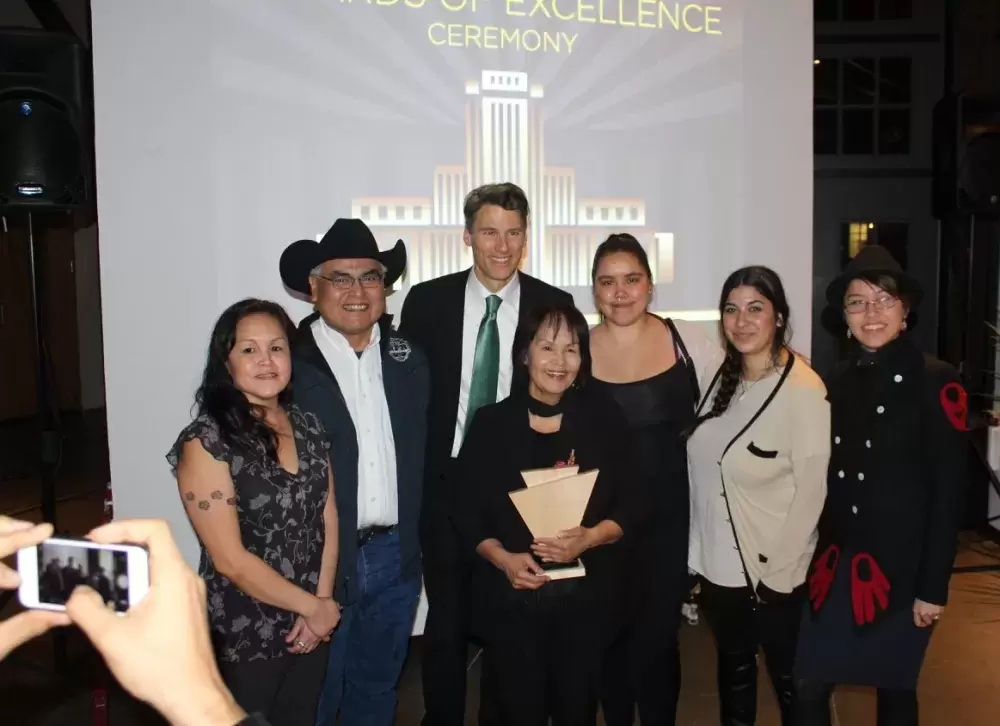Lillian Howard, a member of the Mowachaht-Muchalaht First Nation, is being honored by the City of Vancouver with this year’s Civic Volunteer Award. Howard has been working for decades, in and around Vancouver, as well as on Vancouver Island, to bring people together to respectfully share culture with one another. Howard is currently the co-chair of the Vancouver Urban Indigenous People’s Advisory Committee, but her tireless social justice and environmental work began during her teen years.
“My first job was at home when I was about fourteen,” said Howard. “I was one of those people from the community who was working with archaeologists in our village of Yuquot. It was very interesting because we were looking at artifacts that our ancestors used in our fishing community.”
She added that while some people might feel that kind of activity is disrespectful to the deceased, she felt it was quite the opposite.
“It certainly confirmed what my great grandparents taught about our long lineage in our respective villages, and it made me feel closer to my ancestors in terms of who we are. I learned that my people have been there continuously for 11,000 thousand years,” she said.
And that little job may have sparked a lifetime of similar work—the key piece of bringing people closer to their cultural roots. Howard is of Nuu-chah-nulth, Kwakwaka’wak and Tlingit ancestry, and she’s combined the influence of all three of these in her own healing journey. She recalls spending time with her parents and grandparents around Vancouver Island’s Nootka Sound, berry picking, canoeing, cedar bark stripping, and seafood gathering—all traditional activities. She’s thankful for that time, because she believes really knowing who she was and where she came from kept her strong all these years.
She encourages anyone feeling lost to make that connection.
“One thing we have in common as Indigenous people is our Indigenous values and teachings… I’ve seen so many people, even in cities, disconnected from their homelands, and traditional territories,” said Howard.
“And then when they have that awareness or awakening, relating to our traditional homelands, it gives us a really strong sense of identity in terms of why we do what we do, and in terms of the need for protection of our waters and our lands,” she said.
Along with her current role on the Urban Indigenous People’s Advisory Committee, which is a voluntary position, Howard has worked a multitude of other jobs. She’s worked twice for the Nuu-Chah-Nulth Tribal Council; one as a land claims worker in her early 20’s, and a second round as co-chair in the 90’s. She’s also worked with the Union of British Columbia Indian Chiefs, the Vancouver School Board, the Wish Drop-in Center, the Vancouver Aboriginal Community Policing Center Society, the B.C. Women’s hospital, and right now, works part-time with the Public Health Services Authority Indigenous Health team.
This very newspaper, too - the Ha-Shilth-Sa - is on her list of achievements. She helped get it up and running in 1974.
Howard’s biggest task at the moment is working with the City of Vancouver to create a safe space for families of Missing and Murdered Indigenous Women and Girls for a hearing in April (date yet to be announced). She plans to make sure there is enough support available, that no one leaves feeling re-traumatized.
“Being a residential school survivor, I had lots of challenges, and obstacles and barriers I had to overcome,” said Howard. “It took a lot of years…over twenty years…and I’ll be going through this healing journey right until my deathbed, because there’s been so much historical trauma in my family and my Indigenous community.”
“What my work is really about is Indigenous identity, and the relationships to our homelands, and our teaching and cultural values,” she added.
City Councillor, Andrea Reimer, has been working alongside Howard since the Urban Indigenous People’s Advisory Committee formed seven years ago. She has gotten to know Howard well in that time, and she’s not surprised Howard is receiving one of the mayor and council’s annual awards.
“She’s done quite a lot of work in the community. She has a particular connection to the Missing and Murdered Indigenous Women and Girls, both personally and as a policy. I met her through that work,” said Reimer.
“The idea of a settler government having an Urban Indigenous People’s Advisory Committee… it’s a lot for people to come and sit on that committee. I’ve always appreciated her leadership there, and that she sees a lot of hope and possibility when we’re sitting down to work on these issues,” she added.
Reimer was particularly impressed by Howard’s response to the controversy around the Canada 150 Celebrations. While people were concerned celebrating Confederation meant they were celebrating colonialism and the damage it did to First Nations people, Howard wanted to take a more balanced view, weaving the good with the bad.
“Our inclination was just not to celebrate 150 altogether, but she really felt there was a way to. Because she felt if we can’t figure that out, then how can we move forward?” said Reimer. “If someone would have told me at the outset of those discussions, that the Urban Indigenous People’s Advisory Committee would be the most energetic, and sort of catalyst, for the 150 celebrations, I don’t think I would have believed them. It really tells you about the force of her visions and her ability to bring people along.”







